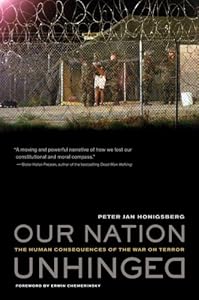 Damien Corsetti was an interrogator at the Bagram Air Force Base in Afghanistan in 2002, where, according to The New York Times, he was known as the “King of Torture.” In 2006, he was prosecuted for alleged abusive treatment he committed while an interrogator, but was acquitted. Nevertheless, he told our Witness to Guantanamo project that he had mistreated his prisoners.
Damien Corsetti was an interrogator at the Bagram Air Force Base in Afghanistan in 2002, where, according to The New York Times, he was known as the “King of Torture.” In 2006, he was prosecuted for alleged abusive treatment he committed while an interrogator, but was acquitted. Nevertheless, he told our Witness to Guantanamo project that he had mistreated his prisoners.
When he began working in summer 2002, Corsetti believed in what he was doing. He thought they were all guilty and, like most Americans, he was angry. He explained how he had obtained information regarding several alleged plots through his interrogations in time for the U.S. to intervene and prevent the incidents from occurring. He saved American lives.
In the months that followed, however, he and other interrogators began to have doubts about their work. They asked a Judge Advocate General, or JAG lawyer, for advice. The JAG attorney assured them that their actions were legal because the Bush administration had decided not to adhere to the Geneva Conventions. After hearing the JAG assessment, Corsetti felt obligated to follow orders.
Corsetti told us how he would hood prisoners, tighten the cord at the neck, and then pour water over the hood. The process wasn’t quite the same as “waterboarding,” but the detainees did experience the sensation of drowning or suffocating.
He forced prisoners into extremely uncomfortable and awkward “stress positions” for hours. He noted how the military later renamed the term “stress positions” to “safety positions,” explaining that the safety positions were for the safety of the interrogators and the military personnel on the base, not the detainees.
Corsetti also described how the detainees were hung by their wrists to chain link fences for hours and even days. Doctors were not present. Rather, people trained as medical technicians checked the detainees’ vital signs while the men were hanging. According to another Witness to Guantanamo interviewee, at least one man died this way in Kandahar, Afghanistan.
In his interview with the project, Corsetti revealed that the military would require all newly arrived detainees to be kept awake for their first 48 hours. The intent was to prolong their sense of capture and their loss of control. Many of the detainees were also sleep deprived for longer periods in order to maintain their sense of disorientation and to “soften” them before interrogations.
There were no written military standards or procedures for the interrogators to follow. After the interrogators had obtained the information they could from a detainee, the detainee was transported to Guantanamo.
Corsetti also did not think the military should have assigned him, as a young 22-year old with only minimal training, to be an interrogator in Bagram. He was smart, but he lacked experience. This was a very high stress position, better suited for someone with a lot more training.
Over the past four years, the Witness to Guantanamo project has interviewed 103 people in 14 countries. We have interviewed former detainees and others who had lived or worked at the prison or were otherwise involved in Guantanamo issues. The others include prison guards, chaplains, interpreters, interrogators, medical personnel, psychologists, habeas lawyers, prosecutors, high-ranking military and government officials and family members of detainees.
During our interview, I asked Corsetti why he agreed to talk to the Witness to Guantanamo project. He replied that he wanted to apologize for his dehumanizing treatment of detainees. He also told us that while interrogating the detainees he began to realize that not everyone he was interrogating was guilty of terrorism. Perhaps it was then that he began his transformation. He remarked that his mother had raised him to treat others as he would want others to treat him.
We also asked Corsetti what he thought of President Obama. As with many other Americans, Corsetti was elated when Obama was elected. He believed that Obama would turn things around, and remove the stain of the Bush administration’s policies of torture. But, instead, Corsetti told us, Obama “doubled down.” Corsetti was struckby Obama’s program of using unmanned drones in the killing of foreign nationalsand also American citizens living abroad.
Drones have become prosecutors, judges and juries. Due process hearings, required under the Constitution before punishment, are nowhere to be found. To some people, Obama’s actions have been even more intolerable, if possible, than those of Bush and Cheney. In addition to killing American citizens and other “combatants” in countries outside Afghanistan, drones kill hundreds, perhaps thousands, of innocent women and children, as collateral damage.
When Obama became president, many of us thought that if he apologized for U.S. actions committed by the Bush administration, Obama would make a grand statement and change destiny. However, Obama did not apologize.
In contrast to Obama, Damien Corsetti, a man once known as the “King of Torture,” had the courage to apologize.
Peter Honigsberg is a professor of law at the University of San Francisco and Director of the Witness to Guantanamo project and author of Our Nation Unhinged, the Human Consequences of the War on Terror
Originally posted on the American Constitution Society website
